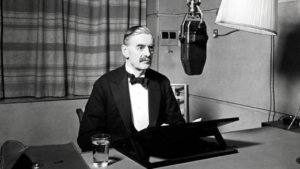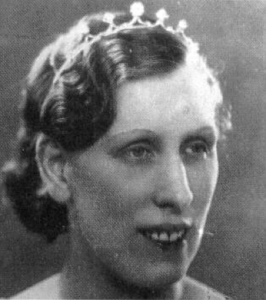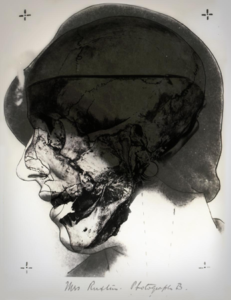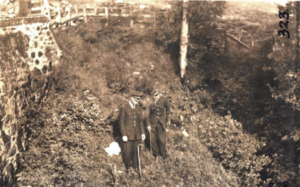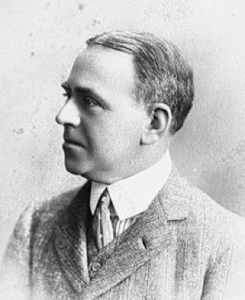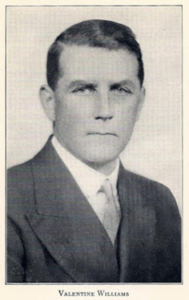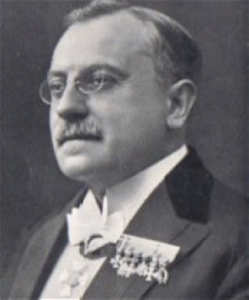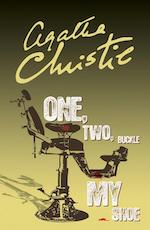
Poirot Score: 68
One, Two, Buckle My Shoe
☆☆☆
Reasons for the Poirot Score
A good story with much that is intriguing. Some interesting discussions for example about the morality of letting a murderer go free, and Chief Inspector Japp is on good form. The complexity of the central plot is entertaining but a reader cannot confidently work out the solution which requires too much that is far-fetched.
Click here for full review (spoilers ahead)
Trivia
Dedication
To Dorothy North who likes detective stories and cream, in the hope it may make up to her for the absence of the latter!
Christie’s daughter, Rosalind, left school shortly before her seventeenth birthday. Christie sent her to Switzerland, France and Germany. Rosalind came back for her London debutante season which she shared with Susan North. A debutante needed preparation, management and supervision to ensure that she went to the appropriate luncheon and dinner parties, dances and events, made the right friends and wore the right clothes. Susan North’s mother, Dorothy, looked after Rosalind along with her own daughter, saving Christie much trouble and time. Christie, as a divorced woman, was not allowed to present her daughter at the Palace. At the end of the season Dorothy North took the two debutantes to South Africa. Christie became good friends with Dorothy, the two often going to exhibitions, opera and ballet together.
Christie had bought her house, Greenway, in Devon, now open to the public as an Agatha Christie ‘museum’, in October 1938. Dorothy North was staying with Christie on September 3rd 1939 when they heard Neville Chamberlain’s wireless broadcast announcing: ‘this country is at war with Germany’. According to Janet Morgan’s biography Christie ‘calmly continued mixing a salad’. The absence of cream was, I imagine, a result of rationing rather than simply due to domestic economy.
Chamberlain announcing ‘this country is at war’
Photo: http://www.bbc.co.uk/schoolradio/subjects/history/ww2clips/speeches/chamberlain_declares_war
Mrs Ruxton
‘I suppose you’re hinting that she’s been murdered now and that we’ll find her in a quarry, cut up in little pieces like Mrs Ruxton?’ [Japp speaking to Poirot, chapter 3, section IX]
On September 15th 1935 Dr Buck Ruxton murdered his wife, Isabella Kerr, and their housemaid, Mary Jane Rogerson. Dr Ruxton was a family doctor practising in Lancaster. He was intensely jealous of his wife and believed that she was having an affair. He strangled her and then killed their maid who was a possible witness. He dismembered both bodies, expertly removing the fingertips in the hope of preventing identification. He wrapped the body pieces in a local newspaper, drove almost 150 miles north into Scotland, near Moffat, and threw the wrapped body pieces into a wooded ravine, not a quarry as Japp suggests, above a tributary of the River Annan.
Some of the body pieces were found on 29th September. The body parts were carefully examined and reconstructed mainly at the Anatomy Department of the University of Edinburgh. The victims were identified using innovative forensic methods that involved superimposing photographs of the suspected victims and X-ray images of the skulls (‘forensic anthropology’). Dental records were also used in supporting identification. The first successful use of dental records to identify human remains had been in 1897 when 126 people had died in a fire in a Paris theatre.
Ruxton was arrested on 13th October. The trial lasted 11 days. The barrister for the defence was Norman Birkett who, ten years later, was the British alternate judge at the Nuremberg trials. The junior barrister for the prosecution was Hartley Shawcross who became Attorney General in 1945 and the chief British prosecutor at the Nuremberg trials. Ruxton was found guilty of murder on the 13th December 1935, and hanged at Strangeways Prison in Manchester on 12 May 1936.
Photos:
Isabella Kerr (Mrs Rushton)
The superimposing of an X-ray image of the skull and a photo of Mrs Ruxton.
Police searching for evidence in the ravine near Moffat
http://murderpedia.org/male.R/r/ruxton-buck-photos.htm
Their old men have dreams
‘Perhaps because I am old. Their old men have dreams – only dreams , you see’ [Poirot speaking to Jane Olivera. Chapter 3 part X]
Jane Olivera and Poirot are discussing politics. Jane is complaining that her uncle, the banker, Alistair Blunt, is too conservative – that he looks backward to history. Jane says that one must look forward not back. Poirot says that this is an attractive vision, implying that he agrees more with her uncle than with Jane and then explains that his view may be because he is old. Poirot is quoting, or slightly misquoting, the King James translation of the Bible. The quote is taken from The Acts of the Apostles, chapter 2 verse 17. The apostles have been filled with the Holy Ghost. Many think that they are drunk. And then Peter stands up, saying that they are not drunk, and begins a sermon: “And it shall come to pass in the last days, saith God, I will pour out of my Spirit upon all flesh: and your sons and your daughters shall prophesy, and your young men shall see visions, and your old men shall dream dreams.”
The Blackshirts and Imperial Shirts
‘You mean that there are people who would like him [Alistair Blunt] – out of the way?’
‘You bet there are. The Reds, to begin with – and our Blackshirted friends, too.’ [Chapter 2 section V]
‘But even if Frank did – did do a foolish thing like that – and he’s one of those Imperial Shirts, you know – they march with banners and have a ridiculous salute, and of course I suppose Mr Blunt’s wife was a very notorious Jewess, and they just work up these poor young men – quite harmless ones like Frank – until they think they are doing something wonderful and patriotic’ [Chapter 7 part IV]
Oswald Mosley was first a Conservative Member of Parliament, then he joined the Labour Party and then formed his own party. After visiting Mussolini in 1932 he became fascist and founded the political party, the British Union of Fascists (the BUF), later that year. The BUF had a broad, extreme, right-wing political programme that included a protectionist, indeed isolationist, approach in which Britain would trade only with the British Empire and thereby be insulated from the fluctuations of world markets. Its policies included radical changes to Britain’s parliamentary democracy. The uniform adopted by members of the BUF was black, based on the Italian fascists. Party members were known as Blackshirts.
The Imperial Fascist League (IFL) was founded in 1929 by Arnold Leese. Leese was never a Member of Parliament. The central policy of the IFL was anti-semitism and included removing citizenship from Jews. Leese refused to merge the IFL with the BUF because Mosley did not want to make anti-semitism a central aspect of BUF policy. IFL members also wore black shirts but with the symbol of the league – a Union Jack with a swastika at its centre – on one sleeve.
I imagine ‘Imperial Shirts’ is a reference to the Imperial Fascist League and that Frank Carter had therefore joined that organisation. Japp’s ironic reference to ‘our Blackshirted friends’ in chapter 2, on the other hand, probably refers to Mosley’s British Union of Fascists.
Mistletoe Bough and Sylvia
‘We opened it up [a fur chest] – and there was the missing lady! Mistletoe Bough up-to-date’
Poirot asked:
‘What about Mrs Chapman?’
‘What indeed? Who is Sylvia (her name’s Sylvia, by the way), what is she?
[Japp speaking to Poirot, Chapter 4 section II]
Japp seems to be an afficionado of popular song. The legend of the Mistletoe Bough involves a young bride who plays hide-and-seek after her wedding breakfast and who hides in a chest all too successfully. She cannot open the chest to escape. Her remains are found years later. The legend was written as a ballad around 1830 with words by Thomas Bayly and music by Henry Bishop – who also wrote the music for Home Sweet Home.
‘Who is Sylvia? What is she,’ is the opening line from a song in Shakespeare’s underrated early play The Two Gentlemen of Verona (Act 4, Scene 2). I doubt whether Japp knew the play. The song has been put to music by many composers. Japp may have known Coates’ version (composed in 1908) or Quilter’s 1933 composition, or possibly Schubert’s song with English lyrics.
Phillips Oppenheim et al
As they went down the stairs again to No. 42, Japp ejaculated with feeling: ‘Shades of Phillips Oppenheim, Valentine Williams and William le Queux, I think I’m going mad!’ [Chapter 4 section IV]
Japp has just been told that Mrs Chapman’s husband worked for the Secret Service. He is referring to three British writers of spy and thriller fiction popular at the time. E. Phillips Oppenheim was a generation older than Christie and wrote over 100 novels, the last in the early 1940s. Many of his books were turned into films. William le Queux, also a generation older than Christie, took up flying and then radio broadcasting with enthusiasm. He was already a popular writer before the First World War and carried on writing almost up to his death in 1927. Valentine Williams was seven years older than Christie. He had been a journalist reporting on many international stories, was awarded the Military Cross during the First World War, and started writing thrillers in the 1920s continuing into the 1940s.
Photos
- Phillips Oppenheim: http://en.wikipedia.org/wiki/E._Phillips_Oppenheim
Valentine Williams: http://thepassingtramp.blogspot.co.uk/2013/01/a-life-of-crime-2-valentine-williams.html
William le Queux: http://www.williamlequeux.com/


